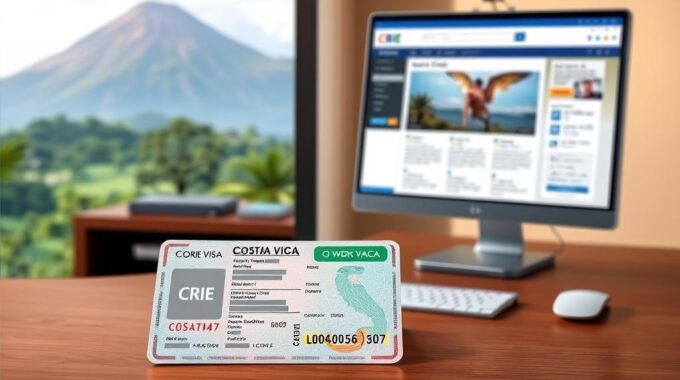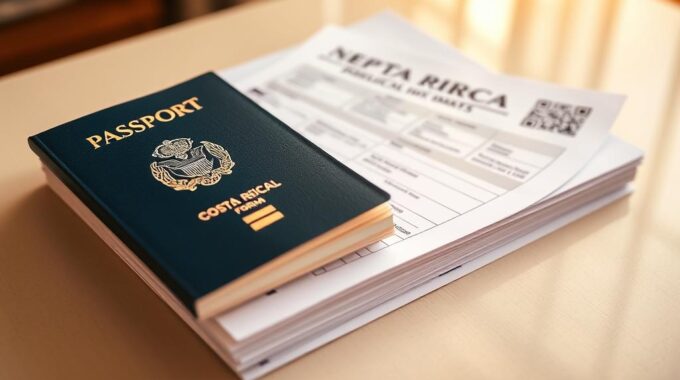Learn about home equity loan documentation in Costa Rica. Discover how to use your property as collateral for loans ranging from $50,000 to $1,000,000.

How to get a work visa in Costa Rica with CRIE
Costa Rica has become a magnet for foreign workers and investors, with many seeking to take advantage of its lush landscapes, vibrant culture, and favorable business climate. However, obtaining a work visa can be a complex process due to the government’s restrictions on foreign nationals working in jobs that can be filled by Costa Rican citizens.
Costa Rica Immigration Experts (CRIE) has helped numerous clients achieve their dream of living and working in Costa Rica. With over 20 years of experience and thousands of successful residencies, CRIE is one of the oldest and most trusted immigration firms in the country, making the work visa process more manageable for foreign nationals.
Understanding Work Visa Requirements in Costa Rica
Foreign workers intending to work in Costa Rica must first understand the country’s work visa requirements to ensure compliance with local laws. Costa Rica has a well-structured legal framework governing foreign employment, designed to balance the needs of the local workforce with the benefits of international talent.
Legal Framework for Foreign Workers
The legal framework for foreign workers in Costa Rica is built around the principle of protecting the local workforce while allowing for the influx of specialized skills. Employers must demonstrate that a foreign national possesses unique skills that cannot be provided by a Costa Rican citizen. This requirement can be challenging due to Costa Rica’s well-educated workforce, which often fills roles such as teaching English.
Who Needs a Work Visa in Costa Rica
Any foreign national planning to engage in paid employment in Costa Rica must obtain a proper work visa before starting work. This requirement applies regardless of the duration of their stay. Tourists and visitors on standard tourist visas are strictly prohibited from engaging in paid work, with potential penalties including deportation and future entry restrictions.
Specific categories of foreign nationals have different requirements or pathways to work authorization. For instance, digital nomads and remote workers employed by companies outside Costa Rica may qualify for specific visa categories. Foreign investors establishing businesses in Costa Rica need appropriate residency permits, and specialized professionals in fields with identified skills shortages may have streamlined pathways to work authorization.
Types of Work Permits Available in Costa Rica
For individuals looking to work in Costa Rica, the country offers a range of work permit options, including temporary residence permits and special category residency. The Costa Rican government has designed these permits to accommodate various types of foreign workers, ensuring that they can contribute to the country’s economy while complying with local regulations.
Temporary Residence Permits
Temporary residence permits are a common choice for foreign workers in Costa Rica. These permits allow individuals to live and work in the country for a specific period, typically ranging from one to three years. To obtain a temporary residence permit, applicants must meet certain requirements, such as having a valid job offer from a Costa Rican employer and demonstrating that they possess skills that are not readily available in the local market. The application process involves submitting relevant documentation, including a valid passport, proof of employment, and proof of financial solvency.
Special Category Residency
Special Category Residency is another popular option for expatriates who wish to work in Costa Rica. This category is designed for specific situations that do not fit within the standard temporary residence categories, offering more flexibility for certain types of workers. Special Category Residency permits are available for religious workers, journalists, professional athletes, and employees of international organizations operating in Costa Rica. Many expatriates utilize this category for employment with multinational companies that have established operations in Costa Rica, particularly within free trade zones. The application process typically requires sponsorship from an employer or organization in Costa Rica that can demonstrate the need for the foreign worker’s specific skills. Special Category Residency often includes work authorization for the specific position or field indicated in the application, and permits are typically issued for one to two years initially, with the possibility of renewal.
Common Challenges When Applying for a Costa Rica Work Visa

Several challenges await foreign workers during the Costa Rica work visa application process. The process can be lengthy and complicated, involving multiple government agencies and extensive documentation.
Government Restrictions on Foreign Workers
Costa Rica imposes certain restrictions on foreign workers, which can affect the work visa application process. The government has specific requirements and regulations in place to ensure that foreign workers do not displace local workers.
The application process can be impacted by government policies, including the need for employers to demonstrate that they cannot find a local candidate for the job before hiring a foreign worker.
Documentation and Bureaucratic Hurdles
The documentation requirements for a Costa Rica work visa are extensive and often require authentication processes such as an apostille or consular legalization. All foreign documents must be translated into Spanish by a certified translator approved by the Costa Rican Ministry of Foreign Affairs.
The bureaucratic process involves multiple government agencies, including the Department of Immigration and the Ministry of Labor, each with its own requirements and timelines. This can lead to delays and complications if not managed properly.
Step-by-Step Process: How to Get a Work Visa in Costa Rica
To work legally in Costa Rica, foreigners must navigate the country’s work visa application process, which involves several key steps. Understanding these steps can simplify the process and help ensure a successful application.
Gathering Required Documents
The first step in obtaining a work visa is gathering all the necessary documents. This includes personal identification, employment contracts, and any other paperwork required by Costa Rican immigration laws. Ensuring that all documents are in order will facilitate a smoother application process.
Applying for a Provisional Visa
Before starting work, applicants must apply for a provisional visa. This initial visa allows individuals to enter Costa Rica and begin the work permit application process. The provisional visa is typically issued for a specific period, during which the applicant must complete the remaining steps.
Registering with the Ministry of Public Security
After entering Costa Rica on a provisional visa, the next step is to register with the Ministry of Public Security. This registration is a critical step that must be completed before proceeding with the work permit application. It involves providing personal and employment details to the relevant authorities.
Submitting Your Work Permit Application
The final step in obtaining a work visa is submitting a comprehensive work permit application to the Dirección General de Migración y Extranjería. The application package must include all previously gathered documents, the registration certificate from the Ministry of Public Security, and employment documentation from the Costa Rican employer. The employer must also submit specific forms demonstrating compliance with labor laws and tax obligations, as well as justification for hiring a foreign worker. Applicants must pay the applicable fees, which vary depending on nationality and the type of work permit. After submission, applicants receive a receipt with a tracking number, allowing them to monitor the application’s status online. While the application is processed, typically taking between 3 to 8 months, applicants are permitted to remain in Costa Rica but cannot start working until the permit is approved and issued. For more information on the benefits of having a work permit in Costa Rica, visit https://crie.cr/benefits-of-a-work-permit-in-costa-rica/.
Alternative Options for Legal Employment in Costa Rica

Foreigners can explore alternative avenues for employment or entrepreneurship in Costa Rica. While traditional work visas are a common route, the country offers other means for foreigners to earn a living, either by working remotely or establishing a local business.
Working Remotely for Non-Costa Rican Companies
One viable option for foreign nationals is to work remotely for companies outside of Costa Rica. This approach allows individuals to earn income without the need for a traditional work permit. Many remote workers are attracted to Costa Rica due to its pleasant climate, rich culture, and relatively low cost of living. By working remotely, individuals can maintain their employment with foreign companies while residing in Costa Rica, provided they comply with the country’s regulations for non-employment residency.
Remote workers should be aware of the requirements for staying in Costa Rica, such as registering with the relevant authorities and obtaining any necessary visas or permits. This option is particularly appealing to digital nomads and professionals with flexible work arrangements.
Opening a Business and Hiring Locals
Another alternative for foreign nationals is to establish a business in Costa Rica. By investing in or starting a business, individuals can obtain a temporary residence permit, known as the “Inversionista” category, with a minimum investment of $200,000 in a Costa Rican business or real estate. This not only provides a more stable immigration status but also allows business owners to generate income through their enterprises.
- Establishing a business offers a pathway to legal residency and income generation without a traditional work permit.
- Foreign investors can qualify for the Inversionista residency category, enhancing their immigration status.
- Business owners can derive income from their businesses, though they must prioritize hiring local employees.
Successful business owners often focus on sectors that leverage Costa Rica’s natural advantages, such as tourism or sustainable agriculture. By creating jobs and contributing to the local economy, foreign business owners can potentially create goodwill with immigration authorities for future residency renewals.
Required Documentation for Costa Rica Work Visa Applications

To successfully apply for a work visa, applicants must submit various documents to the relevant authorities in Costa Rica. The documentation required can be broadly categorized into personal documents and employment-related documents.
Personal Documents
Personal documents are a crucial part of the work visa application process. These include:
- A valid passport with sufficient validity
- A certificate of police clearance or good conduct certificate from the applicant’s home country or any country where they have resided
- Proof of registration with a Costa Rican consulate, if applicable
These documents help establish the applicant’s identity and background.
Employment and Financial Documents
Employment and financial documents are equally important, as they demonstrate the legitimacy of the employment relationship and the applicant’s qualifications for the job.
- A formal employment contract or detailed job offer letter specifying the applicant’s position, responsibilities, salary, work location, and duration of employment
- A statement from the employer justifying the hiring of a foreign worker, highlighting the specific skills or expertise the applicant brings
- Registration documents of the hiring company, including incorporation papers and tax identification
- Proof of income or financial solvency documentation from both the applicant and the employer
These documents are critical in proving the employer’s legitimacy and the financial viability of the employment.
How CRIE Simplifies the Work Visa Process
CRIE’s extensive knowledge and expertise have streamlined the process of obtaining a work visa in Costa Rica. With a deep understanding of the country’s immigration laws and regulations, CRIE provides comprehensive support to individuals seeking to work in Costa Rica.
CRIE’s 20+ Years of Immigration Expertise
CRIE has over 20 years of experience in handling immigration cases, making it a trusted and reliable partner for those seeking to navigate Costa Rica’s complex work visa application process. Their team of experts has a proven track record of successfully guiding clients through the application process, ensuring that all requirements are met and that the process is completed efficiently.
By leveraging their extensive knowledge and expertise, CRIE is able to identify potential issues before they arise, ensuring a smooth and hassle-free application process for their clients. For more information on CRIE’s services, you can visit their website at https://crie.cr/costa-rica-migration-consultants-expert-assistance-with-crie/.
Personalized Consultation and Support
CRIE begins every client relationship with a comprehensive personalized consultation to understand the individual’s specific circumstances, goals, and timeline for obtaining a work visa in Costa Rica. This tailored approach enables CRIE to develop customized strategies for each client, taking into account their nationality, professional background, family situation, and the specific type of work they’ll be performing in Costa Rica.
Some of the key services provided by CRIE include:
- End-to-end support throughout the entire application process
- Document review services to identify potential issues before submission
- Direct communication with Costa Rican immigration authorities on behalf of the client
- Regular status updates and transparent communication throughout the process
- Ongoing support for renewals, status changes, and addressing any compliance requirements
By providing personalized consultation and support, CRIE ensures that their clients receive the best possible guidance and assistance throughout the work visa application process.
Timeline and Costs for Obtaining a Work Visa with CRIE
CRIE helps simplify the work visa process in Costa Rica, providing clarity on both the timeline and costs involved. For individuals seeking to work in Costa Rica, understanding these aspects is crucial for planning.
Expected Processing Times
The processing time for a work permit in Costa Rica can vary, typically taking between 3 and 8 months. Several factors can influence this timeline, including the complexity of the application and the efficiency of the government agencies involved.
To ensure a smooth process, it is essential to submit a complete and accurate application. CRIE’s experts can guide applicants through this process, helping to avoid delays.
- The application process begins with gathering required documents, a step that can be time-consuming if not properly managed.
- CRIE’s experience can significantly reduce the risk of errors, thereby potentially shortening the overall processing time.
Investment Required for a Smooth Process
The total investment required for obtaining a work visa in Costa Rica includes both government fees and professional service costs. CRIE provides transparent pricing based on the specific situation of each applicant.
- Government filing fees vary depending on nationality and the type of work permit, typically ranging from $200 to $500.
- Document authentication and professional translation services add to the overall cost, with fees ranging from $20 to $100 per document.
- CRIE’s professional service fees are customized based on the complexity of the case, considering factors like nationality, employment, and family circumstances.
For more detailed information on the work permit process in Costa Rica, visit CRIE’s work permit page. Every residency application is unique, and CRIE’s immigration experts consider all factors to offer the best price and solutions tailored to specific needs.
Conclusion
With CRIE’s expert guidance, obtaining a work visa in Costa Rica becomes a manageable task. Throughout this guide, we’ve explored the various types of work permits available, the necessary documentation, and the step-by-step application process. Costa Rica’s protective labor policies may present unique challenges, but CRIE’s 20+ years of immigration expertise provide invaluable advantages.
By partnering with CRIE, you gain a comprehensive support system that advocates for your interests throughout the entire immigration process. We encourage you to take the next step by contacting CRIE for a personalized consultation to discuss your specific situation and develop a customized strategy for obtaining your Costa Rica work visa.
Start your journey toward legal employment in Costa Rica today. Call or message CRIE at +506 8706-3888, +506 8373-2085, or for US/Canada residents, +1-305-906-6784. You can also visit www.crie.cr or email info@crie.cr to begin your residency process.


